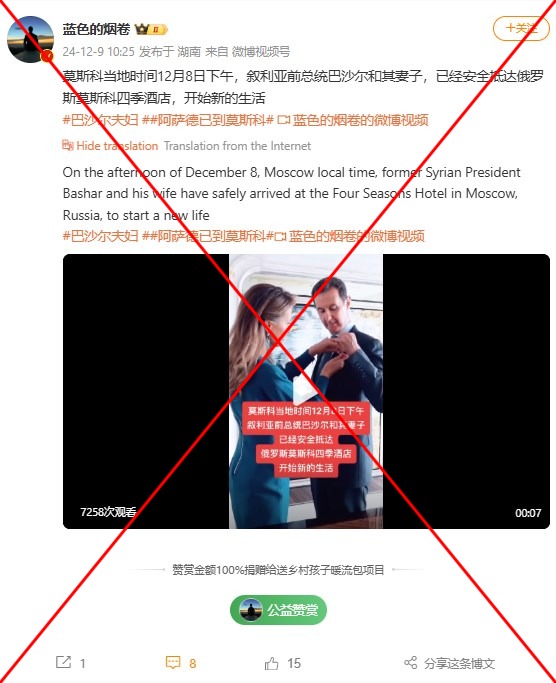In the wake of the dramatic events in Syria, former President Bashar al-Assad reportedly fled to Russia with his family after a coalition of rebel forces successfully captured Damascus, leading to the collapse of his government. Following his departure, various social media clips began circulating, allegedly depicting Assad and his wife, Asma al-Assad, arriving in Moscow on December 8. However, verification efforts revealed that these videos were not recent; they were actually filmed during the couple’s appearance at the Asian Games in eastern China in 2023. This misrepresentation of the footage exemplifies the challenges in verifying information during times of political upheaval and the spread of misinformation online.
The confusion surrounding the videos intensified after a post on the Chinese social media platform Weibo claimed that the Assads arrived at the Four Seasons Hotel in Moscow on December 8. The post stated that the couple had begun a new chapter in their lives following their flight from Syria. The video included in the post shows Asma al-Assad adjusting her husband’s collar and the couple enjoying tea together, which further fueled the narrative around Assad’s supposed arrival in Russia. Misunderstandings and false narratives like this thrive in the chaotic information environment that surrounds major political events.
A thorough investigation into the origins of the footage revealed that the video had been circulating in its true context prior to the falsified claims of Assad’s relocation. Using a reverse image search and keyword analysis, it was discovered that the same video had been posted by the Syrian Arab News Agency (SANA) on September 23, 2023, showing the Assads during an official lunch with Chinese President Xi Jinping. This critical context provided clarity to the situation, illustrating how easily misinformation can spread when people are not diligent about verifying the authenticity of information they encounter online.
Moreover, additional evidence was uncovered linking these clips back to the Asian Games, where the Assads were documented attending various events. A Chinese journalist working for the state-run CGTN also confirmed the context of the video, identifying it as part of a welcome banquet for the Asian Games in Hangzhou. This disclosure, corroborated by images showcasing Asma al-Assad wearing the same attire in both the viral video and at the event, highlighted the importance of cross-referencing sources to establish the truth behind such narratives.
The study of these viral posts showcases how deeply ingrained misinformation can be in social media discourse, especially in politically sensitive scenarios like the Syrian conflict. Additional keyword searches and visual comparisons conducted by media watchdogs helped to debunk numerous instances of misinformation claiming to showcase Assad’s first moments in Moscow following his departure from Syria. This kind of misinformation not only misrepresents the situation but can also influence public perception and understanding of critical events.
In summary, the misleading portrayal of Bashar al-Assad’s movements post-rebellion illustrates the volatile nature of information dissemination during periods of political instability. The story reinforces the need for vigilance among media consumers and emphasizes the critical role of fact-checking in the fight against misinformation. As events unfold, it is vital that the public remains informed by seeking out verified, accurate accounts rather than succumbing to the ease of sharing unconfirmed reports on social media platforms.

